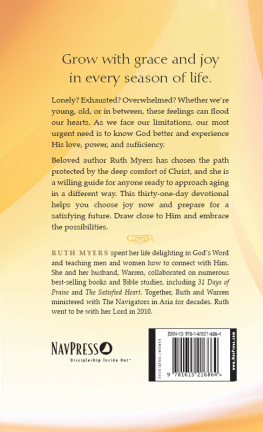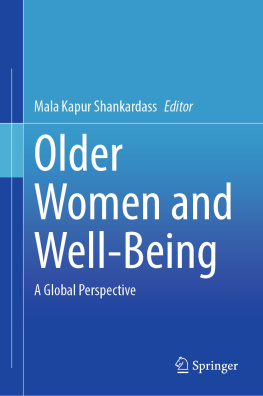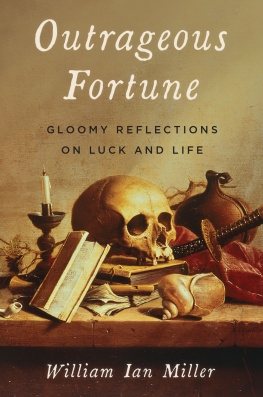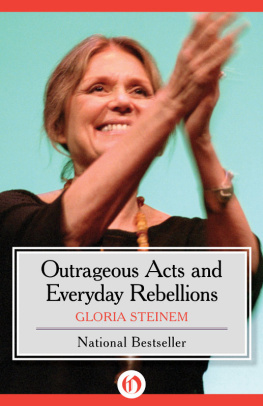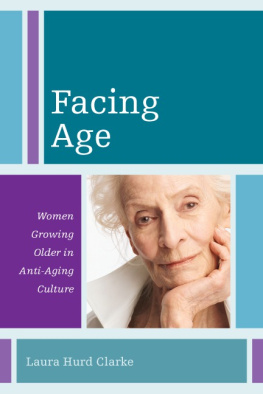Be an
Outrageous
Older
Woman
Advice, ideas,
humor, anecdotes,
poetry, and warmth
for women
in the
second
half of life
S ANDRA M ARTZ , editor of
When I Am an Old Wonan I Shall Wear Purple
Ruth Harriet Jacobs, Ph.D., R.A.S.P.
(Remarkable Aging Smart Person)

CONTENTS
Part One Becoming Outrageous
Why and How to Reinvent Yourself in Your Older Years
Part Two Advocating For yourself With Professionals
From Doctors to Job Counselors to Your Boss
Part Three Remarkable Me
Treating Yourself Well
Part Four Housing Yourself Outrageously
Be the Queen of Your Castle and Enjoy Outrageous, Affordable Travel
Part Five Outrageous Companionship
Fostering Relationships and Social Groups
Rage is in the middle of the word outrageous. Rage occurs when we are frustrated, ignored, hurt, trivialized, denied needed resources, insulted, treated as second-class individuals, and in other ways injured. In our society, women are often discriminated against when they age. This can be as major and open as not being hired or as subtle as being treated as though we are invisible in society and perfunctorily at social gatherings. When we brood about this and take no action, our rage or anger often turns inward, eventually developing into depression or passivity.
However, we can move beyond rage by being outrageous older women, refusing to accept the stereotypes or slights. This book will give you recipes for coming out of rage and into being a magnificent older woman who takes what she can from life to be happy, to be productive, and, above all, to laugh. We need joy in our lives as we age. There are decrements in aging, but we can be creative about increments.
As I grew older, I learned that if you are outrageous enough, good things happen. You stop being invisible and become validated. For example, in 1987, I decided to call myself a R.A.S.P. I had never been a WASP (White Anglo-Saxon Protestant) because, among other disqualifications, I am the wrong ethnic group and too fat. But I figured I could RASP my way though my older years fighting for my own rights and my own joy and for those of other older women. To me, R.A.S.P. stood for Remarkable Aging Smart Person, and I painted it on a T-shirt and sweatshirt to handle all seasons. I also made a R.A.S.P. bottom by putting masking tape over the button of a disliked politician and writing R.A.S.P. with a magic markerbright red, of course.
Other women suggested R.A.S.P. also stood for, as the situation warranted. Ravishing Aging Sexy Person or Radical Aging Strategic Person. Wherever I went, I invited mature women to join R.A.S.P., explaining that it was a treat organization because there were no dues, meetings, newsletters, or financial appeals. Other R.A.S.P. buttons began to appear. By 1990, the prestigious American Aging Society sent me an unsolicited letter addressed to Ruth Jacobs, President of R.A.S.P., inviting me and my members to join. If the American Aging Society says R.A.S.P. is real, it must be. Its no longer just my private joke. So now I ask you to join R.A.S.P.
In this book, you will learn how to start Rasping. What I will offer comes from more than my personal experience. It grew from the research, teaching, and advocacy on women and aging that I have done since I earned my Ph.D. in sociology in 1969, at age forty-five (after getting my B.S. at age 40 while my children were in school). I am the older womens Dr. Ruth, come to tell the truth, and I hope by the time Im done, youll think I am the better one.
My research and my work on behalf of older women has been supported by such agencies as the National Institute of Mental Health, the National Science Foundation, the U.S. Department of Education, the Stone Center for Womens Development and Services at Wellesley (College, and the Wellesley College Center for Research on Women, where I have been affiliated since the seventies. I have learned a great deal from wonderful aging women who have taken my Older Women Surviving and Thriving workshops and from women I have interviewed for my research books and articles. Many of them, like me, had to overcome the internalized cultural bias against aging, especially against aging women.
My own crisis of aging came when I was sixty, an age that signaled to me the end of midlife. When I was nearly sixty-one, I wrote in a poem how I had conquered my fears.
Becoming Sixty
There were terror and anger
at coming into sixty.
Would I give birth
only to my old age?
Now near sixty-one
I count the gifts
that sixty gave.
A book flowed from my life
to those who needed it
and love flowed back to me.
In a yard that had seemed full,
space for another garden appeared.
I took my aloneness to Quaker meeting,
and my outstretched palms were filled.
I walked further along the beach,
swam longer in more sacred places,
danced the spiral dance,
reclaimed daisies for women
in my ritual for a precious friend
and received poets wine
from a new friend who came
in the evening of my need.
In addition to the things listed in the poem, I tried many other new activities the year I turned sixty. By sixty-three, I was really enjoying my older womanhood and asking myself what I wanted to do with the rest of my life.
Please write down now what you want to do with the rest of your life.
When I did my list. I discovered I no longer wanted to work full-time teaching and chairing the sociology department at Clark University, and I resigned to teach only part-time elsewhere and to do other things. Writing the list made me confront my life and change it. It is easy to stick to a known, safe-but-uncomfortable identity. We have to shake ourselves up once in a while. Writing to ourselves can give us access to our deep wishes as my poem that follows did for me.
At Sixty-three
What I want for the rest of my life
is to live simply and joyfully
close to nature and God
ministering, as I am led to do
to people in new ways,
communicating with my children
as equals without dependency
or guilt on either side
or the reliving of old history.
What I want for the rest of my life
is to accept that in my living
I made serious mistakes
but did the best I could at the time.
I want to stop blaming myself
and have as much compassion and respect
for myself as I have for others.
I want to travel to new places
to witness and be touched
by the stories of others
then tell their stories
in my books and poetry
to help people see themselves
in others and know we are all
kindred spirits within the spirit,
and that what injures one of us
insults all of us
while the triumph of one of us
is a mountain climbed by all.
What I want for the rest of my life
is to deal gracefully and graciously
with the decrements of aging
so that by example and testimony
I give others the courage
to see that the missions and ministry
of the aged are as important as of youth
and are important to youth.
Finally, I want to meet my death knowing
that I lived fully, returning to life
the talents and time given me by grace.
Aging gives us a chance to know ourselves and to learn the meaning of life. I have learned, as you should, to enjoy the perks of being olden When a passenger, I happily accept the front seat in two-door cars that require pretzel crawling to get into the back; I am delighted when the sixteen-year-old movie cashiers ask, Senior citizen ticket? which is half-price. I graciously accept snow shoveling help. But I will not tolerate being considered mentally incompetent. In response to the people who, in this youth-oriented society, try to curry favor by calling me and other older women young woman, I say:
Next page

